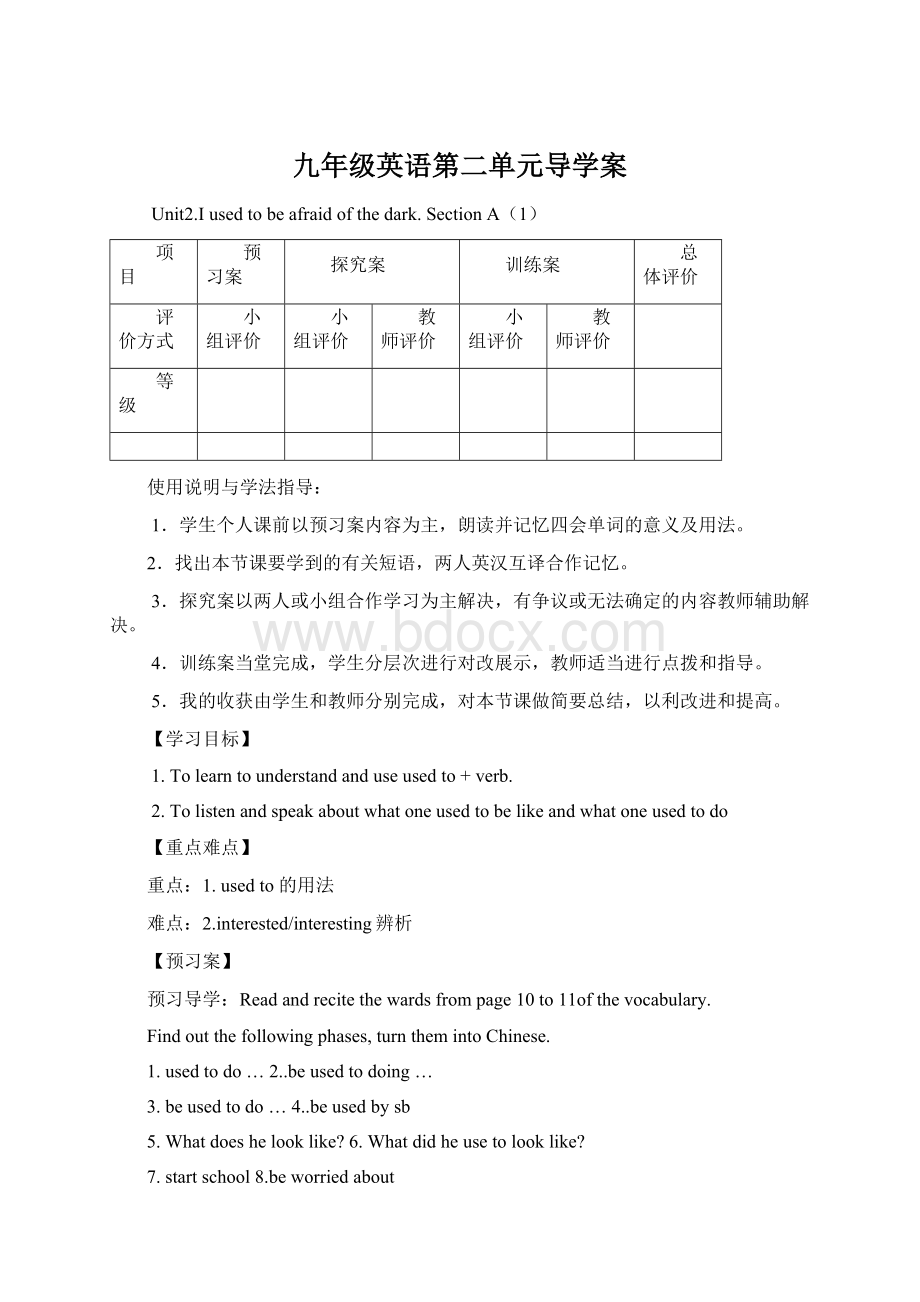九年级英语第二单元导学案Word文档下载推荐.docx
《九年级英语第二单元导学案Word文档下载推荐.docx》由会员分享,可在线阅读,更多相关《九年级英语第二单元导学案Word文档下载推荐.docx(13页珍藏版)》请在冰豆网上搜索。

2.interested/interesting辨析
【预习案】
预习导学:
Readandrecitethewardsfrompage10to11ofthevocabulary.
Findoutthefollowingphases,turnthemintoChinese.
1.usedtodo…2..beusedtodoing…
3.beusedtodo…4..beusedbysb
5.Whatdoeshelooklike?
6.Whatdidheusetolooklike?
7.startschool8.beworriedabout
9.allthetime/always10.walktoschool
11.takethebus12.mybiggestproblem
【探究案】
Sheusedtoplaysoccer,butnowsheplaystennis.
Sheusedtobeshort,butnowsheistall.
Sheusedtohavelonghair,butnowshehasshorthair.
usedto过去常常,后接动词原形。
我们用usedto来表示过去的习惯。
例如:
IcollectedstampswhenIwasachild.
Iusedtocollectstamps(whenIwasachild).
用usedto是把现在和过去形成对照,可以用以下表达方式:
butnow…,butnotanymore,butnotanylonger
IusedtowatchTVorchatwithmygrandmother,butnowIhavetostudy.
Iusedtoeatalargebreakfast,butIdon’tanylonger.
2.interestedadj.感兴趣的;
关心的,beinterestedin对……感兴趣
I’mnotinterestedinpolitics.我对政治不感兴趣。
Heisveryinterestedinwhatarecalledpopularsongs.
他对所谓的流行歌曲很感兴趣。
interested/interesting辨析
interesting是形容词,有主动意味,意为“令人有趣的”,作表语时,主语通常是物。
作定语时,既可修饰人,也可修饰物。
interested也是形容词,有被动意味,意为“感兴趣的,对……感兴趣”,主语通常是人,且多用于be/get/feel/becomeinterestedin结构中。
【训练案】
quiet,shy,funny,outgoing,friendly
从方框中选择适当的单词完成句子。
根据要求完成句子,每空一词。
1.Iusedtobeshyandquiet.(改为一般疑问句)
____you_____tobeshyandquiet?
2.Heusedtowearoldjeans.(改为否定句)
He__________towearoldjeans.
3.Lilyusedtobefunny.(就画线部分提问)
_________he____tobe____?
4.Sheseemstobeworriednow(2008四川自贡)
_______seemsthatshe________worriednow.
5..LearningEnglishis______.Allofthestudentsare______init.
A.interesting;
interestedB.interesting;
interesting
C.interested;
interestingD.interested;
interested
【我的收获】
我的收获:
___________________________________________
我的不足:
__________________________________________
我努力的方向:
________________________________________
Unit2.Iusedtobeafraidofthedark.SectionA
(2)
1.Tolearntounderstandanduseusedto+verbinstatementsandquestions
2.Tospeakandwriteaboutwhatoneusedtobeafraidof
usedto的用法
1.beusedto习惯于;
后接名词、代词或动名词。
2.beafraidof+动名词或+名词/代词;
beafraid+不定式
1.Readandrecitethewardsfrompage11to12ofthevocabulary
2.Read3aandpart4ofthebookofpage12,findoutthedifficultwordsandsentences.
3.Findoutthefollowingphases,turnthemintoChinese.
thesedays/atpresent/now/atthemoment.getupearly
stayatschoolallday.gorighthome
.sb.spendtimedoingsthnotanymore/nolonger
.chatwithsb.takesb.toconcerts
hardlyeverHowI’vechanged!
Howtimeflies!
inthelastfewyears
Readthefollowingsentences,turnthemintoChinese.
1.Iusedtobeonthebasketballteam.
2.Ididn’tusetolikegymclasses.
3.Didyouusetohavelunchatschool?
4.Youusedtobeveryquiet,didn’tyou?
◆usedto用于表示过去习惯性的动作,或表示以前常常存在的状态,与现在形成对比。
usedto可用于各种人称,其中to为动词不定式符号,后接动词原形。
◆usedto的各种句式变化可借助did,也可借助used。
否定句句式为didn’tuseto…或usednotto…如:
Ididn’tusetolikegymclasses.
一般疑问句句式为Did…useto?
或Used…to…?
如:
Didyouusetohavelunchatschool?
变反意疑问句时,附加疑问部分可用didn’t/usedn’t或did/used。
如:
Youusedtobeveryquiet,didn’tyou?
2.beusedto习惯于;
Heisusedtohardwork.他习惯于艰苦的工作。
Heisusedtodrivinginallkindsofweather.他习惯于在各种天气里驾车。
3.beafraidof+动名词或+名词/代词,这里动名词常常表示主语担心发生的事情。
这些常常是无意发生的动作。
Shedidn’ttellhimbecauseshewasafraidofupsettinghim.
她没有告诉他,因为害怕他不安。
4.beafraid+不定式,表示主语非常害怕,以至不敢采取某一动作。
这些通常是有意让发生的动作。
Hewasafraidtojump.他不敢跳。
(他没跳。
)
根据汉语提示完成句子,每空一词。
1.Lucy____________(害怕)thedark,soshenevergoesoutatnight.
2.Ourschoolis_____________(在……前面)GreenLibrary.
3.AfterIfinishedwatchingtheTVplay,I_______________(入睡)soon.
4.Didyou______(过去)playsoccer?
5.去年我每天花费很多时间玩游戏。
LastyearI_______lotsoftime_______gameseveryday.
6.他对足球更感兴趣了。
Heis_____________insoccer.
7.我小的时候常常害怕蛇。
WhenIwasyoung,I____________________ofsnakes.
8最近几年,他一直在生病。
Hehasbeenill____the________________.
我的收获:
______________________________________________________
我的不足:
_____________________________________________________
Unit2.Iusedtobeafraidofthedark.Sectionb
(1)
3.探究案以两人或小组合作学习为主解决,有争议或无法确定的内容教师辅助解决。
1.Tolearntounderstandanduseusedto+verb
2.Toread,write,listenandspeakaboutwhatyouusetolike
1.Toread,write,listenandspeakaboutwhatyouusetolike
难点:
2.beterrifiedofsth与beterrifiedofdoingsth
Seem及worry的用法。
1.Readandrecitethewardsfrompage13to14ofthevocabulary。
2.Listenandrepeat1aand2aofthebookpage13,findoutthedifficultwordsandsentences.
3.Findoutthefollowingphases,turnthemintoChinese.
mydailylife/myeverydaylifemakeyoustressedout
joinsbtakepartin…/joinin…
.moveto…growhairlong
Heseemstired./Heseemstobetired./Itseemsthatheistired.
makelotsoftrouble/causelotsoftroublegetbadgrades
a15-year-oldkid/akidof15yearsoldaproblemchild
arecentconversation
1.Talkthethingsyouusedtolikewithyourpartner.
2.Listento2aand2b,fillintheblank.
3.Readandunderstandthefollowingwords.
(1)beterrifiedof害怕的程度比beafraidof深.害怕…
beterrifiedofsth.如:
Iamterrifiedofthedog.
beterrifiedofdoingsth.如:
Iamterrifiedofspeaking.
(2)worryaboutsb./sth.担心某人/某事 worry是动词
beworriedaboutsb./sth.担心某人/某事 worried是形容词
如:
Don’tworryabouthim.不用担心他。
Motherisworriedaboutherson.妈妈担心他的儿子。
(3)allthetime一直、始终
(4)inthelastfewyears.在过去的几年内 常与完成时连用 如:
IhavelivedinChinainthelastfewyears.在过去的几年内我在中国住
(5)miss:
①思念,想念例:
Ireallymisstheolddays.
②错过,未中,未赶上,未找到.
例:
It’sapitythatyoumissthebus.
Theboyshotatthegoal,butmissed.
(6)nomore(用在句中)=not…anymore(用在句尾)指次数;
nolonger(用在句中)=not…anylonger(用在句尾)指时间.
(7)right:
①adj.正确的,右边的②n.右方,权利③adv.直接地.
(8)ItseemsthatYuMeihaschangedalot.=YuMeiseemstohavechangedalot.
根据汉语提示完成单词。
1.Afterdinner,Janeoften____________(聊天)withhergrandmother.
2.MrsBrownboughtsome__________(糖果)atAlan’sMarket.
3.Youmust__________(咀嚼)foodslowly.
4.Theoldmansells__________(日常的)newspapers.
5.Whatother___________(昆虫)doyoulike?
从括号中选择适当的词汇完成句子。
1.IthinkMrJonesworksvery_____(hard,hardly).
2.Heusedto______(take,spend)lotsoftimeplayinggames.
3.Billusedtohave_______(many,much)timetoplaywithhisfriends.
4.Wow!
Youhave____(so,such)manystorybooks.
我的收获是______________________________________________________
我的不足是__________________________________________
我努力的方向是___________________________________________________________
Unit2.Iusedtobeafraidofthedark.Sectionb
(2)
1.Tolearntounderstandanduseusedto+verb
2.Toread,write,andspeakaboutyourbiggestproblem
1.Comparewhatthingsyoulikeinthepastandnow.
2.Writeabouthowyourlifehaschangedsinceprimaryschool.
1.Readandrecitethewardsfrompage13to14ofthevocabulary。
2.Listenandread3aofthebookpage14,findoutthefollowingphases,learnthembyheart..
havesomuchtime(有那么多时间)thesedays(如今)
allday(整天)gorighthome(直接回家)
spendtime/money(in)doingsth.花费某人多长时间/多少钱做某事
spendtimeonsth.在某事上某人花了多长时间/多少钱
chatwith(与……闲聊)haveto(不得不)
theolddays(过去的日子)takesb./sth.tosomeplace(把某人或某物带到某地)
hardlyever=almostnever(几乎从不)Itseemsthat…/sb.seemstodo/
sbseems+adj(看来..似乎…)
【探究案】
1.学生两人一组朗读reading,完成表格填空,教师抽查给以指导、帮助。
2.小组合作用2b表格中的信息补全3b的这封信。
3.理解并学习下列单词及短语的用法。
(1)spend动词,表示“花费金钱、时间”
①spend…onsth.在某事上花费(金钱、时间)
②spend…doingsth.花费(金钱、时间)去做某事 如:
Hespendstoomuchtimeonclothes.他花费太多的时间在衣着
Hespend3monthsbuildingthebridge.他花费了三个月去建这座桥。
(2)chatwithsb.与某人闲聊 如:
Iliketochatwithhim.我喜欢和他聊天。
(3)takesb.to+地方 送/带某人去某个地方 如:
Apersontookhimtothehospital.一个人把他送到了医院。
Luitookmehome.刘把我送回了家。
(home的前面不能用to)
(4)hardlyadv.几乎不、没有hard困难的;
猛烈地;
hardlyever很少
hardly修饰动词时,通常放在助动词、情态动词之后,实义动词之前。
助动词/情态动词+hardly
hardly+实义动词 如:
Icanhardlyunderstandthem.我几乎不能够明白他们。
Ihardlyhavetime